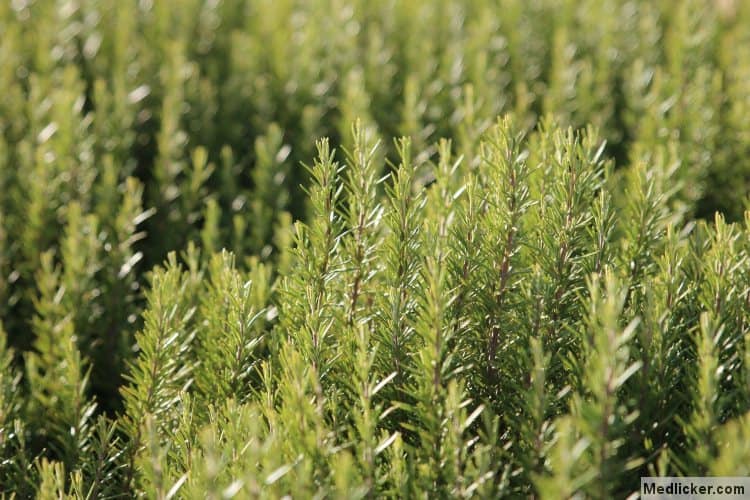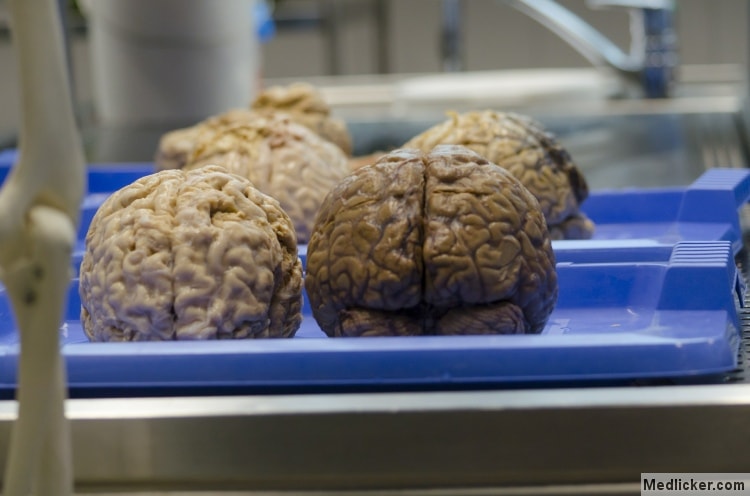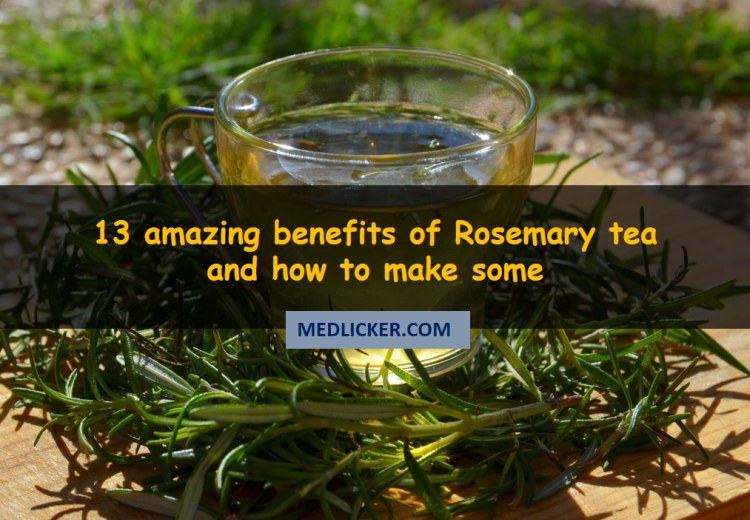13 amazing benefits of Rosemary tea and how to make some
Rosemary tea has lots of benefits. Here is a detailed guide on 13 benefits of rosemary tea, plus some common side effects and precautions. The article also provides instructions on how to make some rosemary tea and general information about history of this tea. Hope you will find it useful :).
What is rosemary tea?
Rosemary tea is derived from the rosemary plant. It is a woody herb with ever-green, needle-like leaves and pink, purple or blue flowers which are present in the Mediterranean region. It is a member of the mint family Lamiaceae in which many other herbs are also present.

The name ‘Rosemary’ is derived from the Latin word for “dew” or “dew of the sea”. The plant is also sometimes called ‘anthos’0 from the Greek word ‘avoc’ which means flower. The plant has a fibrous root system (1).
Classification
Rosemary is one of two to four species of the genus Rosmarinus. The other closely related species is Rosmarinus eriocalyx of the Maghreb of Africa. This genus was named after the 18th Century Naturalist taxonomist Carl Linnaeus.
Description of plant
Rosemary is an aromatic shrub with leaves similar to hemlock needles. The leaves are used for many purposes like as a flavoring in foods like stuffing and roast lamb, chicken, turkey and pork.
The plant is native to the Mediterranean region and Asia but is hard to grow in cooler climates. The plant can withstand droughts and can survive lack of water for a lengthy time period. Its forms are upright and trailing; the upright forms can reach up to 1.5 m tall and sometimes even 2 m in length.
It has evergreen leaves which are 2 to 4 cm long and 2 to 5 mm broad; they are green above and white from below and have short and wooly hair.
The plant is usually grown in spring and summer in temperate climates but it can constantly grow in warmer climates.
The flowers are purple, pink, blue and white in color. Rosemary has the ability to grow beyond its natural flowering season. The plant can bloom flowers in December or mid-February.
Myth
Legend says that this plant was present around Greek goddess Aphrodite when she rose from the sea. It is said that the Virgin Mary rested her blue cloak on a white rosemary and the flowers turned blue. The shrub was then called the “Rose of Mary” (2).
Usage and cultivation
The plant is used as a decorative plant in gardens where it has pest control effects. The leaves are used as a flavor in different foods like roast meat and stuffing.
Rosemary is quite an effective and tolerant plant and that’s why it is used as an ornamental plant in gardens and xeriscape landscaping in the Mediterranean climate. The plant is quite easy to grow and is pest resistant.
Rosemary can grow quite big and remain attractive for many years. It can also be molded into different shapes and hedges and it has also been used for topiary (the art of clipping shrubs or trees into ornamental shapes).
The plant can easily be grown in pots. The groundcover cultivars can spread and have a dense texture (3).

Rosemary is usually grown on loam soil with good drainage in open and sunny position. The plant can’t resist waterlogging and some varieties can even catch frost. The plant grows best in neutral to alkaline conditions with average fertility. The plant can be propagated from another existing plant by clipping a shoot of about 10 to 15 cm long, stripping a few leaves from bottom and putting it directly into the soil.
Historical background
The history of rosemary tea is as old as the rosemary plant. The rosemary herb was used since the ancient times for strengthening the memory of a person. This made it known as the fidelity of lovers. The plant holds a special position among other herbs because of the symbols attached to it. The plant was used in wedding and funerals and banquet halls at festivals and in magical spells.
Rosemary was used in weddings as the wreath worn by the bride but it was first dipped into scented water.
Anne of Cleves wore the wreath at her wedding. A rosemary plant which was tied to silken ribbons of different colors was presented to wedding guests and was considered as a symbol of love. It was also given as a New Year’s guest with its orange stuck with cloves.
The ancient people used rosemary in their religious ceremonies in place of costly incense.
The Spaniards call this plant as one of the bushes which was used as shelter by the Virgin Mary in the flight of Egypt and call it Romero which means the Pilgrim’s flower. The plant is used both in Italy and Spain as a safeguard from witches and evil influences. The Sicilians consider it as young fairies who have taken the shape of snakes and lie in the branches.
Rosemary has a wealth of benefits medicinally. The earliest mention of the herb was in England when Rycharde Banckes recommended to gather one of the leaves of rosemary tea and boil it in water and drink it. He was of the view that rosemary is beneficial against all the evils of the body. Rosemary was also considered as a cure for poor digestion, muscle aches and joint disorders.
Substances present in rosemary tea
Now let us look at the substances present in rosemary. The following is the list of different substances present in rosemary tea:
- Salicylic acid – Salicylic acid is present in the tea which is forerunner of aspirin. That’s why the tea is commonly and effectively used to get rid of arthritic and rheumatic pain.
- Antibacterial and antimicrobial agents – Some antibacterial and microbial agents are also present in rosemary tea which are used to treat different kinds of skin disorders.
- Bornyl acetate – It is a special camphor quite similar to that possessed by cineol, camphene and pinene. It is colorless and has the odor of rosemary and a warm taste.
- Milk – Milk is commonly used in rosemary tea to make it more energetic and tasty.
- Sweeteners – You can add any sweetener to rosemary tea but the two most common sweeteners used are mint and lemon slices.
Nutritional values of rosemary tea
Rosemary has a delicious taste and is quite nutrient rich. The following table shows the nutrients present in the tea (4):| Serving size | 1 cup (containing 1 sprig or 2.3 g of fresh rosemary) |
| Calories | 2 |
| Total fat | 0 g |
| Saturated fat | 0 g |
| Cholesterol | 0 g |
| Sodium | 0 g |
| Potassium | 11.36 mg |
| Carbohydrates | 0.4 g |
| Dietary fiber | 0.2 g |
| Protein | 0.1 g |
Health benefits of rosemary tea
Rosemary tea has been traditionally used for quite some time for the treatment of muscle pain and spasm. The researchers from the University of Maryland Medical Center are of the view that it helps in supporting the circulatory system and the nervous system, improves memory and stimulates the growth of hair. Some major benefits of rosemary tea have been mentioned below (5, 6):
1. Cancer prevention
This is probably the biggest benefit of rosemary tea because cancer is life threatening. A research conducted at the Pacific College of Oriental Medicine shows that rosemary tea can protect a person from cancer. The two main ingredients present in rosemary tea are rosmarinic acid and caffeic acid; these are anti-oxidant and anti-inflammatory agents (7).
These ingredients minimize the damage to the body cells from free radicals which are the compounds that can damage the DNA and make a person vulnerable to other serious diseases like arthritis, cancer and heart disease. Rosemary tea also contains carnosol in it which helps to detoxify the substances which start the breast-cancer process.
Women usually develop cancer when the estrogen hormones in their bodies fall out of balance. Researchers are of the view that rosemary stimulates the enzymes in the liver which can inactivate these hormones.
Evidence from different researches also suggests that rosemary extracts or isolated compounds are quite helpful in reversing the chemically induced cancers.

For example, a topical application of rosemary extract has shown to block the starting and promotion phases of B(a)P and DMBA-mediated skin tumorigenesis. The application of the ingredients present in rosemary tea like ursolic acid and carnosol also inhibited 12-0-tetradecanoylphorbol 13-acetate (TPA) induced skin tumor promotion in DMBA- initiated mice.
Rosemary tea extract has also shown to inhibit the growth of different human cancer cell lines like NCI-H82 (small cell lung carcinoma), DU145 (human prostate carcinoma), K-562 (human chronic myeloid leukemia), Hep-3B (human liver carcinoma), PC-3 (human prostate adenocarcinoma), and MCF-7 (human breast adenocarcinoma). This whole data suggests that rosemary tea is quite beneficial against cancer.
2. Supporting the digestive system
Dyspepsia is a term used to describe the discomfort caused in the stomach associated with eating. A person can experience indigestion due to a number of reasons like abdominal pain or pressure, heartburn or belching (Feeling of excessive gas). The University of Maryland Medical Center suggests that rosemary tea is quite helpful in treating indigestion.
The German Commission E (commission for safety of herbs) has approved the use of rosemary for the treatment of dyspepsia. But some other researchers say that there is no medical evidence behind it.
The use of rosemary tea has also been observed in the treatment of irritable bowel syndrome due to its antispasmodic activity.
Rosemary tea shouldn’t be consumed continuously for medicinal purposes and it should be avoided by women having menstrual difficulties and those who are pregnant because it may stimulate the uterus.
3. Skin conditions
Rosemary tea is also quite beneficial against different skin conditions. It has antiseptic and antioxidant properties (8). A famous nutritional consultant Phyllis A. Balch who is also the author of the book “Prescription for Herbal Healing” suggests that rosemary tea can help against eczema and other skin rashes. Some fungal infections like yeast can also be treated. Rosemary tea also contains camphor which is beneficial in relieving sore muscles.
Rosemary is also helpful in the treatment of eczema which is a painful skin condition which causes the skin to become dry and red and other areas become moist and inflamed. Rosemary stimulates the blood flow through the skin and stops infections.
Some research also shows that rosemary extracts can provide protection to the skin from ultraviolent radiations of the sun.
4. Boosting brain
Rosemary tea has shown promising results in supporting the circulation in brain and improving brain performance. It contains a nutrient called carnosic acid which is a potent antioxidant that can protect the neurons from free-radical damage. A small study published in the Journal of Medicinal Food in January 2010 showed that small doses of rosemary extract can improve the memory in elder adults.

Rosemary has the ability to breakdown an important neurotransmitter in the brain known as acetylcholine. Patients suffering from Alzheimer’s disease can benefit from rosemary due to its ability to improve the brain circulation. Rosemary tea can also be used to reduce headaches and anxiety (9).
5. Solution to bad breath
You should definitely take rosemary tea if you suffer from bad breath even after brushing your teeth. You should simply drink a cup of rosemary tea every morning before leaving your house and you will have a delightful breath all day. Some people have reported that brushing teeth can irritate the gums and cause irritation to the teeth. So you can drink rosemary tea after you brush your teeth every morning (10).
6. Helps against pain
Rosemary can help alleviate the pain of migraines and it is a natural remedy for people suffering from muscle pain, sore muscles and arthritis pain (11).
7. Anti-inflammatory agent
Rosemary has two powerful anti-inflammatory agents in it which are carnosic acid and carnosol. A recent study found out that they stop the creation of excessive nitric acid which is a part of inflammatory process (12).
8. Neutralize foodborne pathogens
A major health benefit of rosemary tea is the inhibition of the growth of foodborne pathogens which can cause food poisoning like Bacillus cereus, Listeria monocytogenes and staphylococcus aureus.
9. Hair health
Rosemary extracts have been widely used to support hair and prevent hair conditions like alopecia (the partial or complete loss of hair from the hair growing regions). Rosemary tea can be used to support scalp and growth of hair.

Rosemary tea can be mixed with borax and this serves as an anti-dandruff solution (12, 13, 14).
10. Respiratory health
Rosemary tea is great for people having respiratory problems. The aroma of rosemary tea can help a person against congestion caused due to respiratory infections, colds, influenza and allergies. The tea can also help against the head pain linked with respiratory illnesses (15).
11. Helps during relaxation
Rosemary tea is frequently used in aromatherapy for relaxing the nervous system; it makes a person calm and he can rest. You can also rub rosemary leaves with your temple and it will function as a pain killer and relieve you from mild headaches. Vapor baths can also help a person alleviate rheumatism. You can also add a few drops of rosemary oil to your pillow; it will help you breathe better when you rest.
12. Detoxification of liver
Rosemary tea is often used for relieving liver problems. Rosemary extracts are helpful against liver damage from tetrachloride in mice and rats (16).
13. Anti-aging properties
Another major benefit of rosemary tea is that it has anti-aging properties. It stimulates the cell regeneration and helps in reducing swelling, raising firmness and improving the overall skin tone.

It can also increase the blood circulation in the skin (17).
Side effects of rosemary tea
Rosemary tea and extracts are generally quite beneficial for health. But they do have some side effects which are listed below:
1. Allergies
Herbs like rosemary are known to cause allergies (18, 19). Some people can tolerate rosemary extracts well but there have been reports of contact dermatitis. This was found in a study conducted at the Department of Dermatology at Hospital Juan Canalejo in La Coruna Spain.
2. Anemia
A research was published in 2001 in the “American Journal of Clinical Nutrition” which found a distinct link between rosemary’s phenolic compounds and the decrease in the absorption of iron. So people with iron deficiency should avoid consuming rosemary tea (20). The topical preparation should be safe.
3. Decrease in reproductive functioning
A research conducted in 2007 showed that rosemary extracts may play a role in decreasing the reproductive functions (21). The research was done on male adult rats.
The researchers observed the effects of the ingestion of rosemary on fertility of two male adult rat groups with levels at 250 and 500 mg/kg body weight for 63 days.
The results showed that the body weights and testes weights wasn’t affected but the weight of ventral prostates, preputial glands and seminal vesicles decreased. A significant decrease in the testosterone levels was also seen.
The sperm density and motility also decreased in male adult rats. The results of this study proves that rosemary tea reduce reproductive functioning but further research is still needed because the study wasn’t done on human subjects.
4. Bleeding
Rosemary extracts can cause serious bleeding problems in some patients (22).

An article was published in 2008 in “Thrombosis Research” which reported that rosemary increases the risk of bleeding when taken with drugs which increase bleeding like blood thinners, aspirin, and anti-platelet medications like Plavix.
5. Diuretic effects
Rosemary tea has been used for quite some time due its diuretic properties. But the University of Maryland cautioned that when too much water is lost in the body due to rosemary then people taking lithium will see the levels of the drug to reach up to toxic levels. So rosemary can effect patients taking furosemide (Lasix) or hydrochlorothiazide and the absorption of these drugs (23).
6. Blood sugar levels
Rosemary extracts have the ability to lower the blood sugar levels in both diabetics and non-diabetics (24). A research was conducted at Jordan University of Science and Technology which proved that sometimes rosemary herb can abnormally lower the blood sugar levels. But the research was done on laboratory animals. So diabetic patients who use rosemary need to get their serum levels checked and should consult the doctor before take rosemary tea.
7. Seizures
Monoterpene ketones are present in rosemary. These ketones are convulsant which can cause seizures when consumed in large quantities. There have been many cases of seizures in healthy adults who take rosemary. Scientists from the University Hospital Department of Neurology in Geneva verified the epileptogenic properties of rosemary.
8. Pregnancy
Previously rosemary extracts were given to women to induce abortions (the medical process of ending a pregnancy so it doesn’t result in the birth of the baby). But a study was published which changed the perspective of doctors.

The study was conducted in 1996 and showed that laboratory animals who were given rosemary extracts suffered from pregnancy loss. So pregnant women should avoid taking rosemary tea (25).
How to make rosemary tea
Making rosemary tea is quite easy. Two methods of making rosemary tea are mentioned here which are making rosemary tea with honey and making rosemary tea with milk. You need to make sure that you have all the ingredients before making the tea and you mix all the ingredients in their right quantities. The methods for making rosemary tea have been mentioned below:
1. Rosemary tea with honey
The ingredients needed for two cups of rosemary tea are:
- 3 tsp. honey
- 1 to 2 herbs of fresh rosemary or 1-1.5 tsp. of dried rosemary
- 2 cups boiling water
How to make
Firstly you need to break the rosemary herb into small pieces. Now boil the rosemary extract in a small pan for stronger taste. You can boil the small pieces with water and honey. Reduce the heat when it is fully boiled. Your tea will be ready after five minutes. You can press rosemary against the side of pan to extract the juice if you want stronger taste.
2. Rosemary tea with milk
The ingredients needed to make rosemary tea with are:
- 1 cup of milk
- 1 sprig of rosemary or 1 tsp. of dried rosemary
- 1 tsp. honey
How to make
Firstly divide rosemary into four pieces and put three of these pieces in a saucepan and add milk in it. Slowly bring it to a boil and reduce the heat of rosemary for five minutes. You need to be patient and stir the milk continuously for five minutes. You should press the rosemary against the side of the pan to get stronger taste. Now wait five minutes. The tea is now ready to drink. Add 1 tsp. of honey for taste.
The bottom line
As you can see rosemary tea has lots of benefits. It helps fight inflammation and thanks to its anti-oxidant properties may also be used as cancer prevention. It also has positive effects on skin and hair health. On the other hand it has some adverse effects, mainly anemia, allergy and is risky for pregnant women and diabetics.
If you want to make a tasty rosemary tea, you will find two popular recipes in the previous section of this post.
Make sure you always get a proper medical advice before drinking rosemary tea. The same goes for any other herbal teas, which tend to be good servants but may turn out to be very cruel and nasty masters.
What about you? Do you like drinking rosemary tea and does it have any positive effects on your health? What is your favorite way to prepare some? Share your views with our readers in the comment section below.
| Written by: | Michal Vilímovský (EN) |
|---|---|
| Education: | Physician |
| Article resources: | See numbered references within the article. |
| Image resources: | Dollarphotoclub.com and Pixabay.com |
| Published: | December 21, 2015 at 6:10 AM |
| Next scheduled update: | December 21, 2017 at 6:10 AM |
Get more articles like this in your inbox
Sign up for our daily mail and get the best evidence based health, nutrition and beauty articles on the web.


Ache in left arm that you should not ignore
Alkaline water dangers: why you should not drink it
How to Avoid Sleepiness While Studying?
23 Foods That Increase Leptin Sensitivity
Low dopamine (e.g. dopamine deficiency): causes, symptoms, diagnosis and treatment options
Swollen taste buds: the ultimate guide to causes, symptoms and treatment
Thin endometrial lining: causes, symptoms, diagnosis and treatment
Pimples inside nose: the complete guide
Holes in tonsils: definition, symptoms, treatment and prevention
How to deal with an ingrown hair cyst
Allegra vs. Zyrtec vs. Claritin
How to get rid of phlegm (excessive mucus) in throat? Detailed guide to medical and home remedies, symptoms and causes
What causes stomach ache after meals?
Allergy to penicillin and alternative antibiotics
Liver blood test results explained